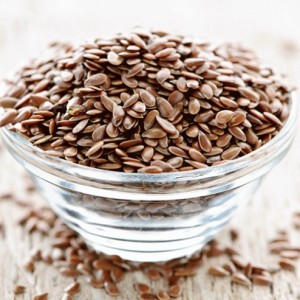Did you know that flax was first cultivated by the late Stone Age lake dwellers in what is now Switzerland? Its use in cooking dates back to 5000 BC Babylon and Ancient Greece. Truly, an original superfood!
What is a superfood? Well, there are super… foods… like green vegetables and blueberries. And then there are superfoods, the less common foods that require only a small amount for your body to experience significant benefits.
Flax is one such superfood, delivering exceptional amounts of fiber, nutrients, energy, and balance in as little as one teaspoon a day. The health benefits to consuming flax seed include:
- Flax seeds are the most concentrated plant source of omega-3 fatty acid, ALA, which is great for brain health, heart health, in fighting inflammation.
- Contain phyto-estrogens, which help balance estrogen levels in the body. In particular, I love flax seeds for their amazing ability to balance our hormones (great for women with pre-menstrual or menopausal symptoms…I think that’s all of us!).
- Increases insulin response, which helps balance blood sugar.
- High in fiber, which supports a healthy digestive system.
- Anti-bacterial, anti-fungal, anti-viral properties.
- Soothing for bronchial complaints, including coughs and sore throats.
- Cancer preventative, particularly breast cancer.
- Shown to lower “LDL”, or bad cholesterol.
Buying and Storing:
Flax seeds can be bought whole, ground, or as an oil. I prefer to purchase the seeds whole, freeze them, and then grind as needed with an inexpensive coffee grinder (I found mine at Best Buy for under $20).
Flax seeds are inexpensive, when compared to other “superfoods”. They can be purchased in bulk from a natural foods store, just be sure the bulk aisle is busy. Flax does go rancid.
To prevent rancidity, store flax seeds whole, in the fridge or freezer in a sealed container. They will last up the three months. Grind as needed.
Flax can also be purchased as an oil. Flaxseed oil is highly perishable and should not be used in cooking. Keep it refrigerated.
Quick Prep Ideas:
Always grind flax seeds before serving; the hard shells prevent digestion and absorption.
Enjoy flax seeds in a variety of simple yet delicious ways:
- Add a sprinkle of ground flax to breakfast fruit, cereals and oatmeal
- Enjoy 1 tbsp into your favorite smoothie
- Try adding them to baked goods for a superfood boost (flax seeds are surprisingly heat stable)
- Try them sprinkled on your favorite salad
- Prepare a quick nut butter and flax dip for your apple slices
- Add ground flax to your favorite granola recipe
- Add ground flax to your favorite Chocolate Flax Energy Bar
- Try flaxseed oil as a replacement for olive oil in salad dressings or in dipping for bread
Note: Like many of our superfoods, moderation is key. Studies show up to 2 tbsp/day to be safe. One teaspoon is often enough to experience the benefits.




